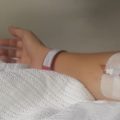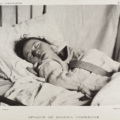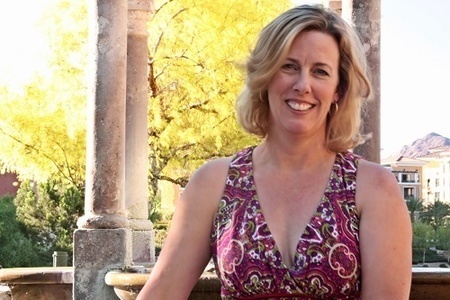My husband and I were suspended in a state of utter shock and disbelief, as the GI/endoscopy center rushed us referrals for a variety of different radiology and imaging services. We were feeling overwhelmed and under pressure, but had precious little time to openly react or otherwise respond to my diagnosis. Right now, we had to have my cancer staged and graded sooner than seemed humanly possible. I drank barium contrast and fasted for digestive system x-rays, I went on a clear liquid diet and temporarily stopped my meds for full-body PET scans, I repeated barium prep for CT scans, and fasted again for MRIs. My diet consisted mostly of chalky colon cleansers, plain water, 7-Up, chicken broth, boiled ham, and scrambled eggs during this time, which trifling as it sounds made me crave a juicy steak and pulpy fruit juice like nothing else. By the end of the month, I was allowed to give into my cravings for a night—a bittersweet reward at best—while we waited in high anxiety for my pending results to come in.
I had a greying, high-grade, stage II-B neoplasm, with partial bowel obstruction, which had enlarged to about three centimeters in size. The tumor had grown through the wall of my colon, but had not yet metastasized to my lymph nodes, bone marrow, or other organs. I did not yet have necrosis or jaundice either, but compromised liver function and tissue death were both very real concerns for me now. The fast-growing lump had apparently started out as a benign polyp, but had turned malignant having gone undiagnosed and untreated. I was relatively young, I’d never smoked, I didn’t drink or do drugs, and I wasn’t promiscuous, so nobody could easily explain how or why this was happening to me (as if those were the only reasons that something like this could happen to anyone). Likewise, no one could tell me how the polyp could have been missed, or why I was denied the medical attention that I had actively and continuously sought, which could have prevented my case of cancer altogether. I did finally and inexplicably get to stay off birth control pills this time though—and, coincidentally, my tumor never increased in size after I discontinued the use of oral contraceptives, hmmm…
The diagnostics and staging completed, we were then referred to a local oncologist, radiologist, surgeon, and hematologist for consultation, healthcare review, and treatment selection. The oncology specialist wanted to do an immediate total colectomy with long-term, post-surgery, high-dose chemotherapy port, and a permanent colostomy bag. The radiation specialist wanted to start with daily, low-dose, external beam radiation, personalized intensity modulation radiation therapy, and low-dose oral chemo, for six months. The surgical oncologist did not recommend surgery for temporary or permanent bowel resection or any surgical procedures for chemo pump placement—in fact, they suggested radiation with or without chemo. The hematology lab would be doing my tumor marker and blood panels one to three times per week as needed throughout my treatment, whichever option we chose. And, me–I wanted biological treatment, but it wasn’t covered by insurance, so I reluctantly had to settle for beam radiation and oral chemo in lieu of extreme abdominal resection surgery, since I wasn’t rich.
Next, everybody gave us the obligatory best-case/worst-case scenarios, after which I was scheduled for my radiation tattoos, body molds, and chemo instruction in preparation for my first treatments and corresponding blood monitoring tests. Having turned down radical surgery and the chemo port (per the surgeon specialist’s advice), my oncologist was suddenly and inconveniently unavailable to see me now. So, my radiologist had to reach the oncology nurse to confirm arrangements for my ongoing blood work and prescription refills, since her boss was neglecting to do so on a regular basis. The oncology nurse also secretly stepped in and reduced my chemo pill dosage by half without telling the oncologist (she told me not to tell him about it either), because as she said—off the record—he had prescribed me a dangerously high amount, comparable to that given to a terminal prostate cancer patient. I had to quit the job I loved, my husband had to stay at the one he hated, and I had to take incompletes and signup for medical leave at school…where only last year I had been hopeful, I was once again despondent.
Just one month into chemo-radiation, I quit menstruating, and was no longer able to be intimate with my husband (my still fairly new husband) for the duration of my treatment (my fairly long treatment). I lost all of my lower body hair from the bellybutton down, and went through major skin tone and skin color changes, along with startling food taste changes, and contemptible chemo fog. It had become a challenge for me just to get off the couch to catch a ride to the doctor’s, so much so that my time was predominantly spent asleep, in treatment, or in diagnostics, by this point. And, when it didn’t feel like things could get any worst, my husband’s company announced their looming bankruptcy and liquidation. That’s when the rejection letters for my previously pre-approved (and thus documented) life-saving medical procedures began to arrive from the insurance company. It’s also when we found out that because my husband’s employer was liquidating, not restructuring, that we would only qualify for one month, not one year, of COBRA benefits, and that the one month of COBRA coverage we were eligible for would cost us $1,300 even in light of the hundreds of thousands of dollars (literally $300,000+ in just one month of the bankruptcy/liquidation notice) in bills which had abruptly begun to flood our mailbox…



















